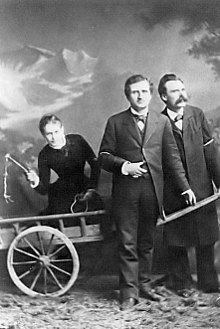Paul Rée
Paul Rée (born November 21, 1849 in Neu Bartelshagen , Pomerania ; † October 28, 1901 in Celerina , Switzerland ) was a German empirical philosopher and later a doctor .
Life
Rée was the second son of a manor owner; the family was of Jewish origin, but Paul Rée was a Protestant. He studied in Leipzig , Berlin and Zurich first on his father's request law , then philosophy. As a one-year volunteer , he took part in the Franco-Prussian War , but was wounded early and thus retired from the army.
In 1875 he received his doctorate "On the concept of the beautiful (morally good) in the moral philosophy of Aristotle ". His attempt to gain a foothold in science through a habilitation failed in 1877.
He had already met Friedrich Nietzsche in Basel in 1873, and in 1875 a friendship developed from this. In the winter of 1876/1877 he lived together with Nietzsche, Albert Brenner and Malwida von Meysenbug at their invitation in Sorrento , where they discussed and worked on philosophical issues. Rée's work The Origin of Moral Sensations was written in Sorrento, as well as parts of Nietzsche's human, all- too- human , expression of Nietzsche's turning away from Wagner and turning to “realism”.
Malwida von Meysenbug and Paul Rée developed an intensive correspondence. The surviving letters from Malwida von Meysenbugs are more than just personal documents of friendship, since one as a “materialist” and the other as an “idealist” took opposing positions, which also describe two trends in the 19th century. The letters also offer insight into the biographical network of relationships between Nietzsche and Rée, von Meysenbug and Nietzsche, and Lou von Salomé .
The young Salomé met Rée on a trip to Italy in 1882, also in the vicinity of Meysenbugs. Like Nietzsche, Rée was drawn to Salomé. After several months of triangular relationship, there was a falling out with Nietzsche. Lou and Rée lived together in Berlin until 1885 , allegedly without being lovers.
After another unsuccessful habilitation attempt , Rée began studying medicine in 1885, which he successfully completed in 1890. Most of the rest of his life he spent in Stibbe ( West Prussia ). There he treated the farm workers on his brother Georg's manor as a doctor.
In 1900 the brother gave up the estate; Paul Rée then went to Celerina ( Switzerland ) and worked as a doctor for the locals. On October 28, 1901, he had an accident while hiking in the mountains and fell into the Inn ; Whether it was actually an accident or a suicide cannot be clarified.
philosophy
Rée's philosophy is characterized by an empirical, unmasking view of the human psyche , especially moral feelings.
In the origin of moral feelings , he divides all actions into “egoistic” and “unegoistic”; The former were originally condemned because they harmed other people, but the latter were praised because they were beneficial to the community. According to Rée, the reason for this assessment has been forgotten, so that today egoism is considered bad in itself and selflessness good in itself.
Friedrich Nietzsche took over the method, but some time after the personal break in his genealogy of morality criticized Rées' conclusions: These were far too simple and were based on a naive utilitarian view.
Works
- Psychological observations. 1875.
- The origin of moral feelings. 1877.
- The emergence of conscience. 1885.
- The illusion of free will. 1885.
- Collected Works 1875-1885. Introduced, commented on and edited by Hubertreiber . de Gruyter, Berlin / New York 2004. (Supplementa Nietzscheana, Vol. 7), ISBN 978-3110150315
literature
- Rée, Paul. In: Lexicon of German-Jewish Authors . Volume 18: Phil – Samu. Edited by the Bibliographia Judaica archive. De Gruyter, Berlin a. a. 2010, ISBN 978-3-598-22698-4 , pp. 194-196.
- Lutger Lütkehaus: A holy immoralist: Paul Rée (1849-1901). Basilisken-Presse, Marburg 2001, ISBN 3-925347-64-X .
- Ruth Stummann-Bowert: Malwida von Meysenbug - Paul Rée: letters to a friend. Königshausen and Neumann, Würzburg 1998, ISBN 3-8260-1464-2 .
Web links
- Literature by and about Paul Rée in the catalog of the German National Library
- Paul Rée, Lou Salomé and Friedrich Nietzsche
| personal data | |
|---|---|
| SURNAME | Rée, Paul |
| BRIEF DESCRIPTION | German philosopher, empiricist |
| DATE OF BIRTH | November 21, 1849 |
| PLACE OF BIRTH | Bartelshagen , Pomerania |
| DATE OF DEATH | October 28, 1901 |
| Place of death | Celerina , Switzerland |
